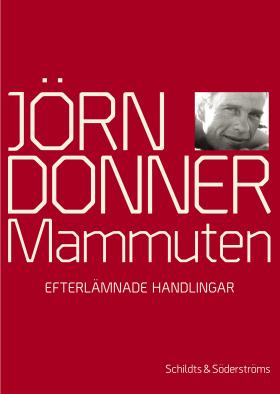
Mammuten eller Jörn Donners efterlämnade handlingar. Om illamåendets historia i Finland. Första delen
(The Mammoth or Jörn Donner's Posthumous Papers. On the History of Nausea in Finland. Part One)
by Jörn Donner
reviewed by Anna Paterson
‘Same old maverick’, Donner followers mumbled under their breath when learning of the title and the huge size of this new work by the master. Maverick and master, Donner is both; a loser when judged by his own wilfully harsh criteria, exceptionally successful by most other people’s. It is easy to see why he should wish to review his 80 years of eventful life, but harder to grasp why he chose this particular format.
Mammuten is an episodic jumble of reportage, fantasy, reminiscent narrative, stray thoughts and quotes from letters and diaries. It shouldn’t work as literature, but does – just. The boring bits – self-pitying reflections, repetitious relationships, dissections of forgotten conflicts – are embedded in an absorbing history of a rare kind of cultural Action Man. Donner is a talented but uneven film-maker and novelist, a party-hopping, ill-disciplined but serious politician on both home and European stages, a largely unsuccessful but enterprising businessman and a keen traveller. Above all, he is a brilliant journalist and a networker of genius who met everybody who was anybody during these past 60 years – Jean-Paul Sartre, Marlene Dietrich, Berthold Brecht and Ingmar Bergman, to name but a very few.
Donner is aware that his restlessness can be bewildering, even off-putting and suggests that it is driven by his dual identity as a Finland-Swede, fluent in both languages and both cultures, but not rooted in either. His background is upper-class, cultured Swedish-Finnish, but his political stance a Finnish-inspired Euro-socialism and his take on Finnish Finland is a mixture of patriotism and distance. Arguably, his best works are books and documentaries about foreign places. When his interest in politics merges with a fascination for a place, he is consistently good, from Rapport från Berlin (1958) to Rapport från Europa (1990).
Despite a slight pretence of having created a work of fiction – an imaginary acquaintance at a loose end steps in to edit the Donner papers and adds occasional comments – Mammuten is pure Jörn Donner, an exploration of self that is more demonstrative than analytical when it comes to both his achievements and his failures. Donner is curiously baffled by what makes him tick and, generally, seems mildly uninterested in the inner workings of people’s minds. Despite having observed at close range so many of Europe’s cultural and political figures, he tends to report on what they do but shy away from who they might be.
This blind spot in his otherwise impressive capacity for analysis might be part of the reason why his fiction, in print and on screen, has failed to have the impact he must have expected. Of almost fifty books, eleven are novels linked by a family saga and the rest a mixture of free-standing novels, biographies and reportage. His filmography is as impressive and as varied as his bibliography – he has been a producer, director, script-writer and actor as well as having held occasional jobs, from editor to soundtrack manager.
All of which seems consistent with Donner’s approach to himself in Mammuten. Rather than an every-minute-matters but essentially novelistic approach on the model of Karl Ove Knausgård’s huge autobiography, Donner’s is a kind of highly subjective non-fiction, set out in 33 ‘books’. Some have spoof titles along the lines of The Art of Not Becoming Swedish, some proper, serious ones like Europe’s Road to Freedom 1988–1991, while still others delve into private stores of bitterness, as in Accounts of Eight Half-Empty Years and The First Cancer. A Collection of Melancholias. All contain plenty of buried truffles that will please cultural and literary historians, from disarmingly frank personal revelations to keyhole views of the great and the good.
Every time, Donner’s buttonholing insistence on telling you ‘all’ confirms his complete belief in the worth of being himself. Maddening but persuasive, he convinces the reader that this self-belief is justified. Exceptionally intelligent as well as an intellectual, he displays sheer brainpower, which imposes shape, style and interest on the extraordinary miscellanea of his life.

Mammuten eller Jörn Donners efterlämnade handlingar. Om illamåendets historia i Finland. Första delen
Schildts & Söderströms, 2013. 1136 pages.
